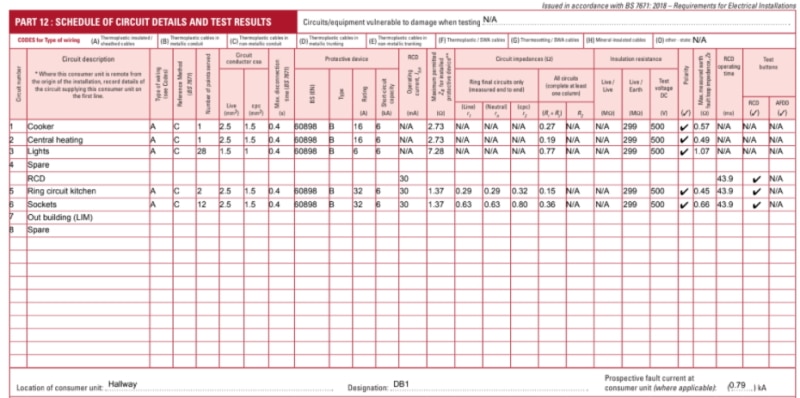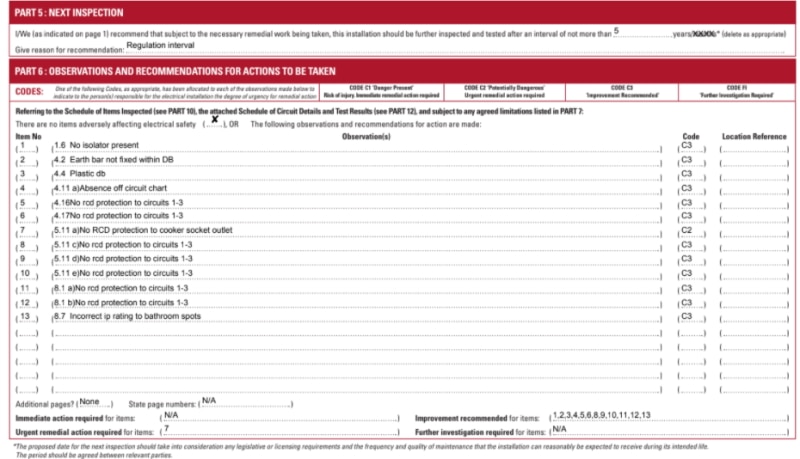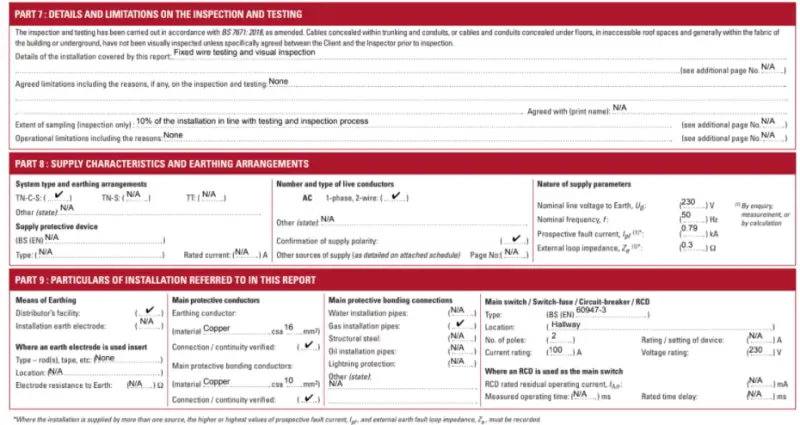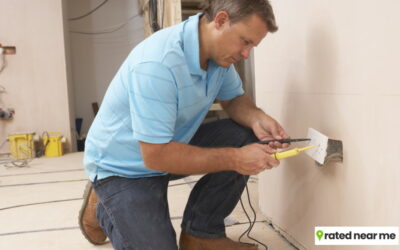Guide to Electrical Installation Condition Reports
Household electrical safety checks are highly recommended for homeowners – and are mandatory for most UK landlords. Keep your home safe by obtaining an electrical safety certificate.
It’s easy to take for granted the smooth, uninterrupted operation of electrical circuits, appliances, light fittings and plug sockets in domestic properties.
However, like so many aspects of our homes, all of these elements are subject to wear, tear and deterioration after years of continuous use.
What are the risks?
Worn or faulty electrical wiring, fixtures or appliances pose a serious fire hazard.
Electrical Safety First estimates that electricity causes over 20,000 accidental fires in UK homes each year. In addition to the very real risk of injury or death, these fires also cause over £100million of property damage each year.
Even new appliances and newly installed electrical installations can pose a fire hazard if they are faulty or have not been properly installed.
UK Electrical Safety Certificates
Thankfully, UK homeowners can get peace of mind by hiring trusted electricians to conduct an inspection and produce an Electrical Installation Condition Report (EICR).
This UK electrical certificate should be produced every 5-10 years, however, you may wish to carry out this electrical safety check more frequently.

This article will summarise everything you need to be aware of when it comes to EICR certificates – from the cost of an EICR report, to what work is carried out, and how you should choose an electrician to conduct an EICR.
We will cover:
- EICR cost
- EICR work overview
- Why is an EICR needed?
- EICR for Landlords
- How to choose an electrician to carry out an EICR
EICR Certificate Cost
Can any electrician do an EICR? Can I do the EICR myself?
An electrical safety certificate test should only be conducted by a competent electrician.
The UK Health & Safety Executive states that “You can do your own electrical work if you are competent to do so.”
However, the reality is that only a qualified and experienced electrician has the level of competency required to conduct an EICR. Unless you are a qualified electrician, you should not conduct an electrical safety certificate test yourself.
How much is an EICR UK?
The single biggest factor that determines the cost of an EICR report is the size of your home. This is because the larger your home, the more appliances, sockets and circuits there are to test.
UK homeowners can expect to pay the following electrical safety certificate costs for a local electrician to test the electrical systems:
| Size / Type of Property | Average EICR Cost |
|---|---|
| 1 Bedroom Flat | £100 to £150 |
| 2-3 Bedroom Flat | £120 to £230 |
| 3-4 Bedroom House | £200 to £250 |
| 5+ Bedroom House | £300+ |
Factors Affecting The EICR Cost
The costs listed above are representative EICR costs. In addition to house size, there are other factors which may determine the final price you pay for an Electrical Installation Condition Report:
1. Wiring Age – Older wiring, or homes with a mix of outdated wiring and new wiring, can take longer to inspect. This is simply because it can take longer to identify and test the different circuits and wiring in use in different parts of the home against the current wiring regulations.
2. Number of Electrical Appliances & Circuits – Some electricians may check a certain number of circuits and appliances as standard, but charge more for additional testing. If you have a larger home with a number of different electrical appliances, check with your electrician to see what their quote includes. Ideally, you should check all fuse board circuits, sockets, electrical fixtures and appliances – but it is common for an electrician to test a sample selection.
3. Regional Variations – As with so many trade prices and the cost of living in general, the cost of an EICR in London or the South-East is likely to be higher than in other parts of the country.
What does an EICR test involve?
During an EICR test, an electrician will test the consumer unit (fuse board), electrical circuits, protective bonding, appliances, plug sockets, light fixtures and other electrical fittings within your home.
The inspection will identify and record hazards such as faulty appliances, faulty electrical connections, and overloaded circuits.
They will record their findings on a report such as the one below. For each element inspected, the report will label its condition under one of four categories: ‘Danger Present’, ‘Potentially Dangerous’, ‘Improvement Recommended’ or ‘Further Investigation Required Without Delay’.

How long does an EICR take?
It will take approximately 3-4 hours for a registered electrician to carry out the electrical tests as part of an EICR. However, more time may be required depending on the complexity of your electrical circuits, the size of your home and the number of electrical devices being tested.
What if the EICR identifies a problem?
No matter the age of your property, your home wiring, or your appliances – it’s possible that the electrical installation condition report will identify issues with your electrical wiring, fittings or appliances.
In these instances, it’s highly advisable that you hire a qualified electrician to carry out remedial works. Even if the issues identified are ‘Improvement Recommended’, many issues are likely to worsen and become dangerous if left unaddressed.
The following works may need to be carried out after an EICR inspection:
1. Change Electrical Fixtures & Fittings
An EICR may simply recommend that one or more individual fixtures (such as light fittings or power sockets) should be replaced. A simple plug socket is inexpensive to replace and can cost under £50 including parts and labour. A light fixture will be similarly cheap in terms of labour, however, the overall cost is highly dependent on the cost of the new lighting fixture that you choose.
It is possible to replace these units yourself (consider: ‘are you competent?’). However, with safety in mind and the risk of an electric shock, many choose to simply hire a professional electrician.
2. New Consumer Unit (Fuse Box)
In order to ensure the continued safe operation of the electrical systems in your home, you may be advised or required to change the consumer unit (commonly known as the ‘Fuse Box’).
Replacing a fuse box can cost between £350 and £600 depending on the number of circuits in your home (usually linked to the size of the home: larger home = more circuits).
3. Home Rewiring
This larger job is the most expensive remedial work that you may be advised or required to carry out. As we explore in our UK Electrical Wiring Guide, some UK homes will have outdated wiring that might be frayed, cracked or unsatisfactorily insulated after years of use.
Electrical wiring can typically be expected to last between 30 and 40 years. However, if the wiring throughout your home conforms to old standards and is showing signs of wear and tear, it may be that your home needs rewiring.
Costs of rewiring a complete home can range from £2,000 for a one-bedroom flat, up to around £6,500 for a 5 bedroom house.

Does my property need an EICR?
It is recommended that an EICR is conducted on your home every 5-10 years.
However, there are a number of other reasons why you might choose to have this relatively inexpensive electrical check more frequently.
You are looking to sell your home – For homeowners looking to sell their home quickly, investing in an EICR can help prospective buyers be confident that the home has no electrical faults (and therefore be more willing to meet the asking price and close the deal quickly).
Home & Property Insurance – Some insurers require that a recent electrical inspection (EICR) has taken place to confirm the condition of a home’s electrical circuits and appliances. They may request to see this prior to providing cover, or before upholding any claims related to an electrical fire.
You are a UK landlord – Electrical checks for landlords form an essential part of your responsibilities to keep tenants safe and your rental properties up to electrical safety standards (more below).
EICR For Landlords
Is a landlord electrical safety certificate a legal requirement?
Landlords have additional responsibilities to ensure that their property is safe and habitable for their tenants. These include ensuring that a property has regular gas and electricity safety checks.
There is no bespoke landlord electrical safety certificate, however, landlords can obtain a certificate in the form of an EICR.
The Legal Requirement
Under the Electrical Safety Standards in the Private Rented Sector Regulations in England, landlords are required to have their property’s electrics inspected and tested at an interval of at least every 5 years.
A copy of the report (an EICR) must be supplied to any current tenants, new tenants when they enter the property, as well as the local authority on request.
If the inspection highlights the need for remedial or investigatory work, this work must be completed within 28 days of the report. Upon completion of any work, the tenant and local authority should be notified in writing within 28 days.
Scotland also requires that landlords have periodic electrical inspections at their property and an EICR in place. While there are no specific comparable regulations in Wales and Northern Ireland, it is still highly recommended that landlords in these countries undertake an EICR test at least every 5 years.
Choosing An Electrician For Your EICR Report
As noted, an electrical safety inspection should only be carried out by an electrician. There’s little doubt as to the importance of getting electrical work right, so it’s always best to choose a qualified, EICR electrician near you.

Here are some key considerations to help you choose the right electrician for the job:
1. Hire Local – Hiring a local electrician can have a number of benefits. An electrician who lives locally is more likely to be able to drop by and give you an accurate electrical safety check cost (EICR quote). They will also already have knowledge about the homes in your area – including their typical circuit set-ups and the likely age of the wiring, fixtures and consumer units.
2. Hire a Qualified Electrician – A competent handyman may be able to help you with smaller electrical jobs such as changing a plug socket. However, an EICR test should be carried out by qualified electricians. An experienced electrician is likely to be registered as an NICEIC Approved Contractor or will be on the government-approved Registered Competent Person database.
3. Hire a Highly Rated Electrician – Just because an electrician is qualified, it doesn’t necessarily mean that they provide a first-class service. A trusted local electrician should have plenty of positive client testimonials on their website or social media pages. You can also use our free service to ask electricians in your area to provide electrical safety certificate prices.
4. Get Multiple Quotes – Make sure that you are getting the best EICR certificate cost by requesting quotes from multiple electricians. You can use tools such as Rated Near Me to get competitive quotes for electricians in minutes.
EICR Cost – A Potentially Life-Saving Investment
If you are a landlord with a property in England or Scotland, Electrical Installation Condition Reports are mandatory for your property. However, even for those homeowners who simply live in their homes, an EICR test is an essential investment.
Nearly all home improvement projects and inspections involve weighing up the upfront cost with the likely benefits. Often, the projects with clear benefits (such as installing double glazing) come at a significant upfront cost.
However, while spending £100-£300 on an EICR report is not an insignificant amount of money, it’s difficult to put a price on knowing that the electrical circuits and appliances in your home are safe. What’s more, homeowners can wait at least 5 years before their next EICR.
Why not get your EICR sorted out today?
You can use Rated Near Me to request EICR certificate costs from highly rated local electricians – in just a few clicks!



